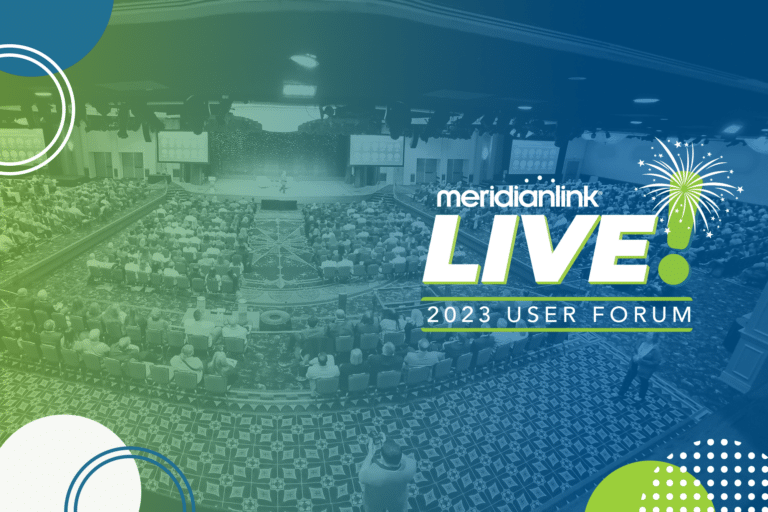The following post is part of a series of blogs written by MeridianLink® Partners who will be attending MeridianLink LIVE! To learn more about the event, click here.
Americans love spending money, but lately, that money is increasingly being spent on short-term vacations and concerts. Experiential spending in moderation is a great way to improve mental health and make long-lasting memories. However, spending all this “fun money” is perilous for many Americans’ financial wellness. Did you know that almost 40% of Americans don’t have the savings they’d need to cover a $400 emergency? Most Americans (62%) report living paycheck to paycheck.
It’s time for Americans to invest in their financial futures and focus on financial wellness with a tool like SavvyMoney®. By leveraging innovative technology to create a seamless and personalized digital banking experience, SavvyMoney empowers individuals, particularly those seeking financial wellness, to achieve their financial goals with confidence and ease.
What’s up with American spending?
As young adults, boomers and Gen X were more likely to put their money toward long-term investments like a house, retirement fund, or education rather than spend it now on short-term expenses. So, what’s changed? Several factors are contributing to people’s beliefs that they need to spend their money now:
- FOMO (fear of missing out) from the effects of COVID. COVID hit many people hard. Weddings were postponed, funerals were missed, vacations were canceled, and people don’t want to miss out on anything else now that the coast is clear. Rather than saving funds for the nebulous future, many Americans are taking advantage of the time and money they have right now to buy the boat or go on that extravagant vacation.
- Potential homebuyer defeatism. Between high-interest rates and ever-rising home prices, many Americans in their 20s and 30s have resigned themselves to the thought that they’ll never be able to afford a home. Nearly three out of four (72%) renters see homeownership as an unattainable goal. Since they see saving for a house as out of the question, many are more inclined to spend money on things they would otherwise de-prioritize.
- Climate change consequences. Because of the effects of climate change, including devastating hurricanes and blazing wildfires, many people fear their dream vacation destination may be subject to the consequences of extreme weather in the near future. Because of this worry, many people are going on their dream vacations now rather than hedging their bets for the future, even if that means going over budget.
The repercussions of this splurgy of spending could affect not just individual consumers but the U.S. economy. The economic reality for many Americans spending money this way is debt. Much of this type of discretionary spending gets put on credit cards, and if credit card holders don’t pay off their balance at the end of the month, that debt can rack up quickly. Many Americans, especially younger members of Gen Z, don’t understand the fundamentals of borrowing—for example, how interest works or the implications of leaving a balance on their credit cards.
Beyond accruing debt, many Americans also lack savings, especially for retirement. Going on vacation and seeing live music is fun now, but the long-term consequences of not saving for retirement will haunt those who spend now instead of saving for later. More and more people with retirement accounts are also taking an ill-advised draw ahead of time. Withdrawing from a retirement account before you’re 59 ½ years old comes with hefty fines and tax penalties. Ultimately, these consequences place early borrowers even further behind their savings goals.
The answer is education
Accumulating debt and resorting to early withdrawals from retirement funds often stem from a larger issue: insufficient knowledge about lending practices. Many individuals unknowingly find themselves burdened with excessive credit card debt and depleted savings due to a lack of understanding about interest rates and potential tax penalties. The consequences of this financial ignorance become apparent later in life, leaving people in their 60s with inadequate savings and substantial debt.
However, the solution lies in empowering individuals with the right education in lending practices. It’s crucial for people to comprehend the intricacies of loans, interest rates, and the impact of financial decisions on their overall well-being. SavvyMoney’s Financial Checkup tool serves as a valuable resource for enhancing financial literacy in the lending domain. By providing detailed insights into spending patterns and cash flow, users can analyze their budgets, assess debt-to-income ratios, and cultivate a better understanding of their financial health.
And there is an appetite for this kind of education. Last year, 57% of Americans sought out financial advice. However, only 22% looked toward their banks or other financial institutions (FIs) for this advice, so there is plenty of room for FIs to step up and provide the information that most Americans seek. This is the perfect opportunity for banks to take on the mantle of trusted financial guides that can illuminate Americans’ financial paths forward.






